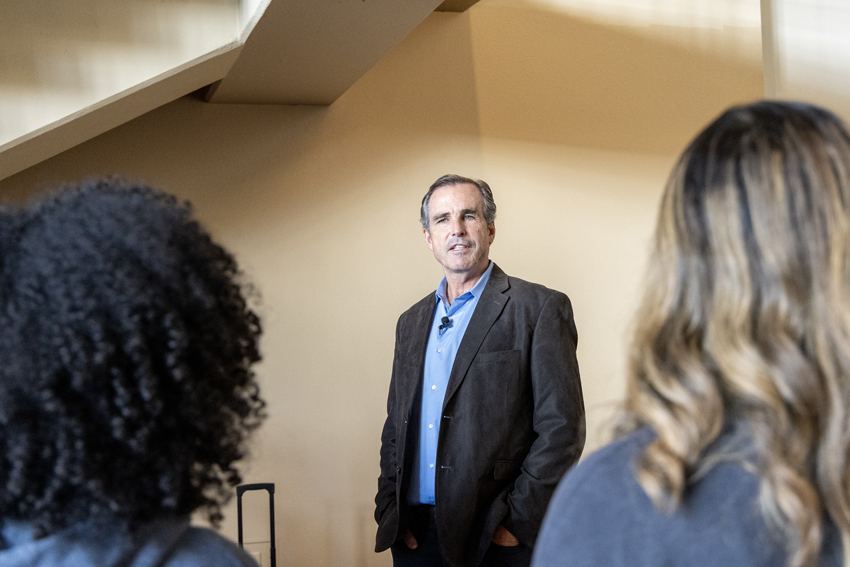Before going on a date or to a movie with friends, showers, using shampoos and conditioners, and other grooming applications are common place. Makeup often completes the desired look, with bedtime routines consisting of washing faces with over-the-counter products and brushing teeth.
Millions of teens and adult women use cosmetic and personal care products in their everyday lives. While makeup can range in price from $3 lipstick to $40 foundation, it seems beauty costs a hazardous price.
“Every day I use seven different kinds of makeup, four products in the shower, two in my hair, toothpaste, deodorant, acne cleansers, perfume and lotion,” Emily Schoettler, ’11, said. “I’ve been using most of them for over three years.”
According to The Campaign for Safe Cosmetics, many common personal care products contain carcinogens, mutagens or reproductive toxins linked to cancer, birth defects and other health problems. For five years, the coalition has worked to protect consumer health and workers, by phasing out harmful chemicals in the health and beauty industries.
?Every day we use multiple personal care products, from shampoo to deodorant, lotion to makeup, that contain chemical ingredients that are absorbed through the skin, inhaled or ingested,? according to The Campaign?s 2007 brochure, Unmasked. “Some of these chemicals are linked to cancer, birth defects, learning disabilities and other health problems that are epidemic in our society.?
While the often-small amounts of toxic chemicals may seem negligible, repeated use from various products can amount to harm.
?The cosmetics industry says it?s safe to put toxic chemicals linked to cancer, infertility or other health problems into personal care products, because the amount in each product is too small to matter,? according to Unmasked, ?but none of us use just one product.?
?Think about how many products you use in a single day, in a year and over a lifetime,? according to Unmasked. ?Small amounts of toxic chemicals add up and can accumulate in our bodies.?
Along with recent pressure placed on cosmetics companies, organizations have formed to advocate safer ingredients in personal care products. One such organization, Teens for Safe Cosmetics, formed in 2002 in response to rising breast cancer rates in Marin County, California.
According to the Teens for Safe Cosmetics? website, ?Marin County breast cancer rates had risen an alarming 60% in eight years.? Reacting to the community?s inaction, Judi Shils established the Marin Cancer Project, now known as Search for the Cause (SFTC), ?with hopes of better understanding the risk factors in our lives that may be causing cancer rates to spiral.?
Teens for Safe Cosmetics list 12 harmful chemicals in daily personal care products that should be avoided, known as the Dirty Dozen.
On a broader scope, the researchers at the Environmental Working Group (EWG) compiled Skin Deep, a safety guide to cosmetics and personal care products. Skin Deep tested ingredients in more than 25,000 products against 50 definitive toxicity and regulatory databases, then rated them on a scale of 0-10 with low hazard (0-2), moderate hazard (3-6) and high hazard (7-10).
However, not only women are at risk. Men also use several personal care products each day, from after-shave to deodorant, which can be potentially dangerous.
According to Unmasked, “two products marketed to men to color gray hair (EBL GreyBan and Grecian Formula 16) contain lead acetate, which can harm fertility and impact the development of a child before birth.”
Skin Deep places some men’s products in the high hazard category, but “lists many safer alternatives.” While Tyler Duerr, ’10, does not use Skin Deep, he does use eight products daily, some of which he has used for years.
“I’m surprised that toxic chemicals could be in the stuff I use each day,” Duerr said. “It worries me, because I’ve used some of the same stuff for about two years.”
Besides rating products by hazard, Skin Deep lists every active chemical and any potential dangers it might cause. It also recommends safer alternatives for each product, rendering harmful chemical exposure prevention simple.
Those wishing to support the EWG’s efforts, and petition Congress for stricter regulations on cosmetics and personal care products manufacturers, may do so at Skin Deep.







Logan Rood • Feb 5, 2010 at 6:48 am
The freshman class really has a hard time getting along. We always have to blurt out and yell random things. Its very entertaining though.
Chantelle Brown • Feb 5, 2010 at 6:48 am
If you were in the room when this picture took place, you could say that it was a funny but also noisy moment. SCRUBS are gonna make a pretty good video no matter what movie they throw at us! GO US!
Alexandra Frea • Feb 5, 2010 at 6:48 am
I really like this picture because of all of the different expressions on everyones faces.
In the back, I can see Maddie’s face full of excitement. Is she excited about N.O.T.S.? or is she happy to see Mary?